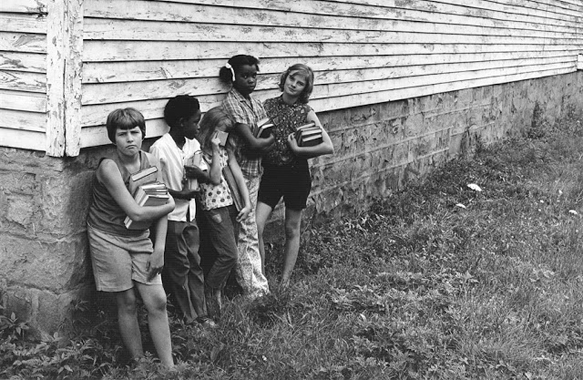Photograph; Appalachian Children.
By Paul L. Thomas, Ed.D. | Originally Published at the Becoming Radical. May 20, 2014
Henry David Thoreau, Walden
Since October 1999, when I experienced several weeks of unrelenting panic attacks, I have been negotiating my lifelong struggle with anxiety—many of those years spent completely unaware of the problem and then coming to recognize and even understand a condition that to most people seems completely irrational (even silly).
Not to slip into being simplistic, one of the foundational ways in which I have come to understand better anxiety is that my body responds to the civilized world in ways that prehistory demanded.
In other words, when human existence depended on a constant state of vigilance, anxiety, that quality was passed on from human to human since those humans most vigilant—most aware of the world around them—lived long enough to procreate.
Now, although no mountain lion lies in wait to pounce upon me and make me its lunch, I live in a constant state as if that were true—hyperaware of both the world and every possibility about that world.
And that is the seemingly irrational part for those who do not experience incessant anxiety. Of course, I know better, but anxiety of the type I experience is beyond rationality.
Thus, for me (and possibly my fellow sufferers of anxiety), The Walking Dead (both the graphic series and the TV series) serves as a powerful allegory for our condition because surviving humans in that imagined post-apocalyptic world actually must exist always aware of the omnipresent possibility of zombie attack.
Post-apocalyptic Mindset in a Civilized World
To survive and thrive as a human has always been, is currently, and likely will be in the context of finite resources for survival and thriving.
For much of human history (and in our imagined post-apocalyptic worlds), those finite resources were necessarily the focus of human competition.
In the 21st century, humanity has not yet eradicated existence-as-survival among large numbers of people (disproportionately children, with no political power) born into and living in extreme poverty. However, in so-called developed countries, we do have pockets of organized societies that have built resources that, although still finite, are adequate to eradicate existence-as-survival if those people had the political will to address the distribution of those resources.
The U.S. is one such country that does not suffer under a scarcity of resources, but under an inequitable distribution of resources, one that allows (and even perpetuates) scarcity for some and abundance for others (primarily determined by anyone’s accident of birth).
I want to pose two claims now:
- The U.S. as a civilized nation could establish an equitable society in which the basic minimum human condition would insure that all have access to those resources that support both the need to survive and the urge to thrive.
- That ideal cannot be attained as long as the U.S. remains entrenched in ideologies committed to rugged individualism, competition, and institutional pursuits of “grit” and “zero tolerance.”
Not only are U.S. commitments to #2 counter to achieving #1, but also those commitments serve only to support the minority elite class that benefits from those ideologies despite having rarely exhibited those qualities.
In other words, the ruling elite have been born into abundance and haven’t experienced the anxiety of scarcity, but they demand that those born into and living in scarcity rise through a manufactured culture of competition—even though we have an abundance of resources to make such social Darwinism unnecessary.
As just one example, researchers and advocates of “grit” actually recommend placing impoverished and minority students in fabricated situations of scarcity to teach them the “grit” those researchers and advocates claim is the source of achievement among the affluent (a claim that, in fact, is at best misleading, and at worst, simply false).
And to add insult to injury, those outliers who have risen through scarcity to thrive have been co-opted into the post-apocalyptic mindset maintaining that since some have fought to survive, others must fight to survive.
The alternative of a society in which such base struggles do not have to occur is either ignored or trivialized as a soft option beneath our ruggedly individualistic culture. We boast, in fact, when we make other people suffer: “I taught him a lesson.”
As someone trapped in an irrational existence governed by anxiety—an existence dramatized in the fabricated world beyond the zombie apocalypse—I treasure the possibility of rejecting the post-apocalyptic mindset in a civilized world.
We know that scarcity creates anxiety and that any person suffers under the weight of scarcity, notably if that scarcity is avoidable. We also know that everyone benefits from a condition of abundance (see Scarcity).
And thus, I remain offended by the incessant refrain offered by those with the loudest voices in our society, voices that demand the least among us must work twice as hard as everyone else to earn the basic dignity of human existence the privileged have handed to them.
It is, ultimately, a shallow call against the world we could create, a world unlike our prehistoric past and unlike our fabricated post-apocalyptic future.
It is world where we no longer foster competition, but make competition unnecessary—as it already could be if we recognized we are no longer slaves to scarcity but to the inequitable distribution of resources that erases our humanity in very real ways that have nothing to do with zombies.
Many people throughout the world and in the U.S.—many children—lead lives of quiet desperation, desperation about food, shelter, health, and happiness.
One new fact of the human condition, however, is that those people do not have to lead lives of desperation. For those living in abundance, the choice to end scarcity is ours.
That we appear unwilling (not unable) to do so causes me great, and for once, justifiable anxiety.












Leave A Comment